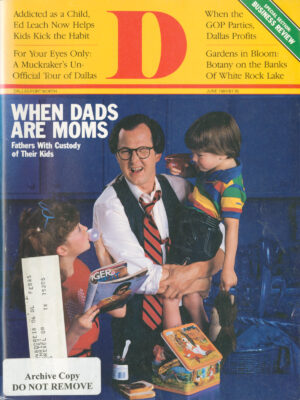IF A LINE EXISTS between the public’s so-called right to know and an individual’s right to privacy, that line is ignored today with such a vengeance that its existence seems more a mistaken memory than a fact. We have allowed this right to know, journalism’s Jolly Roger, to supersede all other rights-from a family’s right to private grief to a democracy’s right to decide an election’s outcome only after all the votes are counted (instead of when the networks declare the outcome). The attitude that there is nothing we need not know is loose among us.
Several years ago, on the front page, right along with the weather report (hot and dry), one of Dallas’ newspapers published the story of a young mother who had been brutally raped and murdered. There, on Page One, the newspaper saw fit to include far more of the grotesque facts than anybody ever needed to know. This courageous publishing act did not win a Pulitzer Prize that year, and, as you might imagine, the victim was not the wife of either the publisher or the editor. She was just another victim for whom even death failed to provide a refuge from the public’s sacred right to know.
It’s futile to wonder how the woman’s husband and her mother and father and children felt when they read that reporter’s story. Their rights to private grief took a back seat to our right to know every detail-no matter how irrelevant, sordid or painful-that a reporter’s energy and total disregard for decency could uncover. After all, journalists are told to get the story, to leave no detail unreported. And in this pursuit, there is no longer any such thing as going too far. Did Shana Alexander know the extent of her heresy when she wrote, “We yeam for the right not to know”?
The reporters are the easy targets here. How can we ask them to exercise restraint when we are such willing accomplices? We read what they write, and our attention rivets on just the kind of sordid facts alluded to earlier. We may be shocked, but we keep reading. Then (and this is what the publishers know about us), we inevitably come to expect those kinds of details; then, we become used to reading it; then, we’re ready to follow the reporter just a little bit farther into the depths of what we neither need to know nor should know. This relationship is made respectable by the phrase “the right to know” in the same way that used cars are now called “pre-owned.”
There’s a similar issue concerning the artist and how far his right to create extends. Where does it collide with an individual’s right to privacy? In February, Tom & Viv, a play by Michael Hastings, opened in London. The play dramatizes T.S. Eliot’s marriage to his first wife, Vivian. In writing the play, Hastings had a little problem: He couldn’t get his hands on all the background information, so he simply made up what he couldn’t find out (although I would guess that Hastings would prefer to say “imagined” rather than “made up”). Eliot believed that “readers should read what writers published and not dwell on apparent or even real biographical connections.” He believed that access to a writer’s work was sufficient for us; his life belonged to him. Therefore, most of his papers are in storage at Princeton University, off-limits to the public until the year 2019.
At the time Hastings’ play opened, Eliot’s second wife, Valerie, was working on a book of his letters. In the play (which I have only read about), Eliot is portrayed as trying, in less than gentlemanly ways, to have his wife committed to an insane asylum (which, in fact, she was). Where did Hastings get his information? As an artist, he got it from his imagination. “In the absence of photographs,” he explains, “I have to make drawings.”
The play has caused a furor, especially among Eliot supporters. What’s worth examining is writer Ray Sokolov’s piece in The Wall Street Journal. He writes about Valerie Eliot: “In the legal sense, she has a perfect right to protect Mr. Eliot’s privacy and her own.” Quite magnanimous of Mr. Sokolov. He goes on: “No doubt she also has a moral right in this regard.” He has now granted her the moral right to protect her husband’s memory. However, these legal and moral rights may not count because of another right (you know what’s coming, don’t you?), Sokolov concludes. “But there is another right to be considered here; the right of readers to know what can reasonably be known about one of the very greatest writers in the language.”
My questions are: Who grants us this right? How much do we need to know? Does this right stand supreme, and is there any room for decency and civility alongside it? Is there anyone out there willing to exercise restraint? As for Hastings, he simply used the old trick that made movie magazines so successful: Promise inside info, and deliver conjecture at best and lies at worst.
Get our weekly recap
Brings new meaning to the phrase Sunday Funday. No spam, ever.
Related Articles

Arts & Entertainment
DIFF Preview: How the Death of Its Subject Caused a Dallas Documentary to Shift Gears
Michael Rowley’s Racing Mister Fahrenheit, about the late Dallas businessman Bobby Haas, will premiere during the eight-day Dallas International Film Festival.
By Todd Jorgenson

Commercial Real Estate
What’s Behind DFW’s Outpatient Building Squeeze?
High costs and high demand have tenants looking in increasingly creative places.
By Will Maddox

Hockey
What We Saw, What It Felt Like: Stars-Golden Knights, Game 2
It's time to start worrying.
By Sean Shapiro and David Castillo


